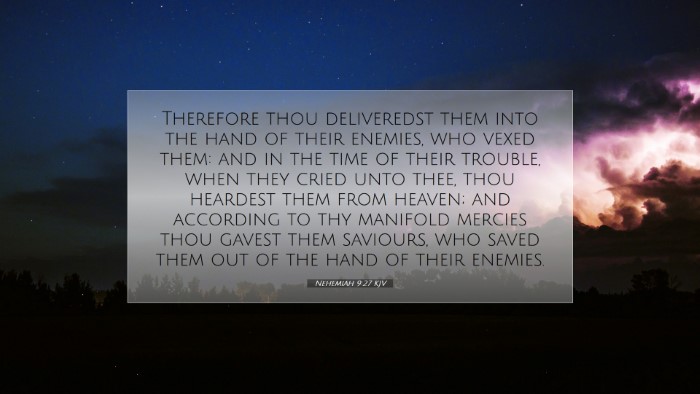Commentary on Nehemiah 9:27
Nehemiah 9:27 states, "Therefore thou deliveredst them into the hand of their enemies, who vexed them: and in the time of their trouble, when they cried unto thee, thou heardest them from heaven; and according to thy manifold mercies thou gavest them saviors, who saved them out of the hand of their enemies." This verse is part of a larger prayer of confession and recounts the history of Israel's relationship with God, highlighting themes of sin, judgment, repentance, and redemption.
Historical Context
The context of Nehemiah's prayer is crucial for understanding its depth and gravity. After returning from Babylonian exile, the Israelites engaged in a communal reflection on their past and their covenant with God. This collective memory serves to acknowledge their disobedience and to celebrate God's enduring faithfulness.
Theological Insights
- Divine Judgment and Mercy: The verse illustrates a significant theological principle: God’s judgment is often a response to Israel's disobedience. However, alongside judgment, God's mercy abounds. The fact that God 'heard' their cries reflects His readiness to restore.
- Historical Recurrence: The Israelites repeatedly fell into sin, leading to oppression, yet they were met with God’s salvation. This cycle underscores the deep-seated need for redemption and foreshadows the ultimate salvation found in Christ.
Commentary Insights
Matthew Henry
Henry emphasizes the profound theme of God's mercy despite Israel's recurrent unfaithfulness. He notes that God’s willingness to raise 'saviors' repeatedly throughout Israel's history underscores His continual compassion. Henry suggests that this redemptive act should prompt believers to reflect on their own need for a Savior.
Albert Barnes
Barnes offers a pragmatic lens, asserting that Israel's cry for help demonstrates the human condition—how in times of distress, individuals often turn back to God. Barnes notes that the 'saviors' appointed were likely leaders or judges who delivered Israel from their enemies, pointing out the theological implication that true salvation comes from God who raises individuals for His purpose.
Adam Clarke
Clarke elaborates on the character of God's mercies, emphasizing that they are 'manifold,' indicating their diverse and abundant nature. He correlates the saviors mentioned in the verse to the judges and leaders in Israel’s history, highlighting that they were instruments of God's deliverance rather than divine themselves. Clarke suggests that this illustrates God's method of intervention in human affairs through appointed leaders.
Practical Applications
For pastors and theologians, Nehemiah 9:27 serves as a poignant reminder of the importance of penitence and God's faithfulness in the face of communal sin:
- Encouragement in Prayer: The verse assures believers that their prayers are heard in times of trouble. Pastors can encourage congregations to seek God's mercy in their distress, affirming that God responds to the cries of His people.
- Understanding Leadership: The role of leaders in the community of faith is significant. As the 'saviors' in the text served to deliver Israel, church leaders today bear the responsibility of shepherding their congregations toward God's redemption.
- The Cycle of Repentance: Acknowledging the biblical pattern of sin, judgment, and restoration can help believers understand God's nature. Teaching this cycle promotes an awareness of the importance of confession and reliance on God's grace.
Conclusion
Nehemiah 9:27 encapsulates a key moment in Israel's history where the themes of sin, suffering, and salvation converge. Through the insights of ancient commentators, modern pastors, students, and theologians can glean rich theological understandings that inform their teaching and practice today. God's actions in the past serve not only as historical accounts but as living testimonies of His character—one who hears, saves, and responds to the outcry of His people with manifold mercies.


